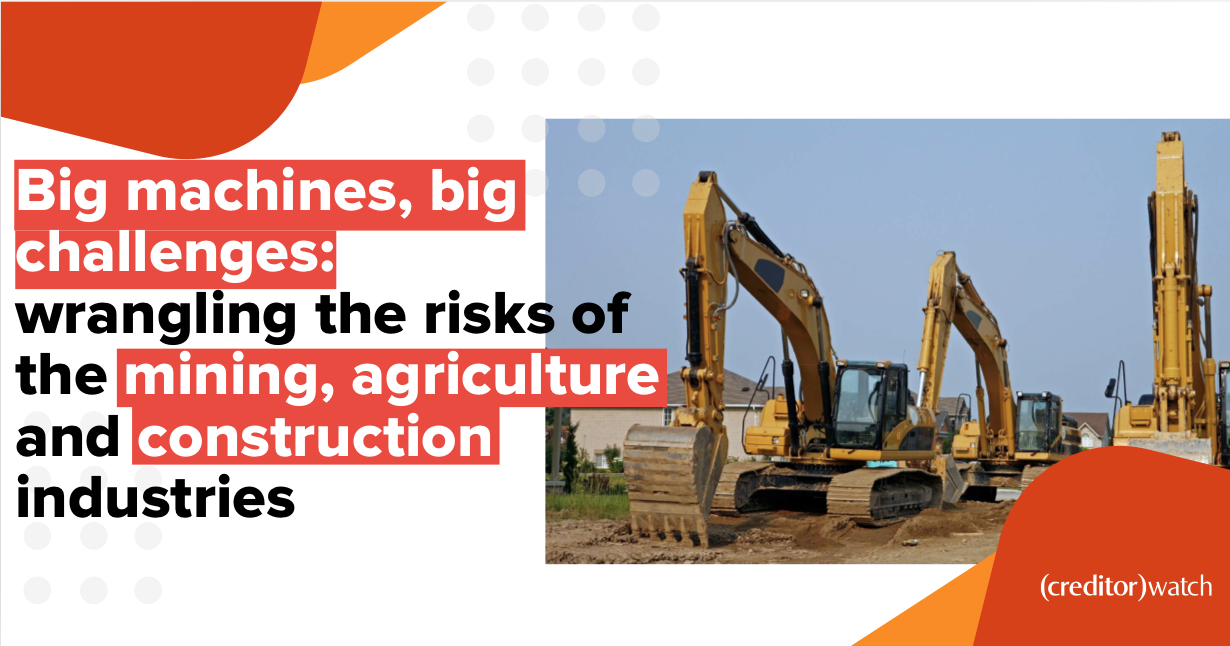Right now, there’s a lot going on for the business community to deal with.
The pandemic and climate change have impacted us all in different ways with multiple flow-on effects. Some have endured far tougher times than others but one thing we all have in common is that we’ve had to quickly adapt to these unfolding global events.
In Australia, both changes have left their mark on three of our key industries: mining, agriculture and construction. The knock-on effects are immense but not always obvious, so let’s look at the multiple forces at work. What factors have converged to create serious challenges for these sectors, and what impact on economic activity has so much uncertainty had?
Mining challenges
While the demand for commodities always varies over time based on demand in overseas markets, there have been more extreme fluctuations of late due mainly to the pandemic and geopolitical tensions. Coronavirus-related travel restrictions have contributed to skilled-labour shortages, fuel prices have surged, and there has been a drop-off in demand from China. There have also been issues around the financial viability of overseas building companies that previously had a strong appetite for Australian mining products.
Such global uncertainty has been challenging for the capital-intensive mining industry. There’s also climate change to consider, with an increasing focus on renewables and environmental concerns. The mining industry is under increasing pressure to introduce initiatives to reduce emissions and ‘decarbonise’. A study by McKinsey found that global emissions from the mining industry totalled two billion metric tons in 2018.
Australian mining companies need earthmoving equipment to set up projects (which are always expensive), but the impact of all these global issues created less certainty around their revenue and making payments on time. What could go wrong? As we’ve learned in the past two years: a lot.
Agriculture challenges
Australian farming has suffered hardship after hardship in recent years – drought, floods, bushfires, and mouse plagues. Now, it is facing the prospect of La Niña potentially bringing more flooding.
On top of all this, COVID-19 travel restrictions have impacted the agricultural labour market with backpackers and overseas workers prevented from coming to Australia to work as fruit and vegetable pickers. Prices of many food crops such as avocados and strawberries have plummeted due to oversupply as demand from the hospitality industry dried up during lockdowns. Now the spread of the Omicron variant among transport workers is preventing produce from being delivered to markets, however this is only expected to be a short-term problem.
The pandemic also caused disruptions to global logistics, with shipping delays, Omicron infections and high fuel prices all affecting Australian farming. There has also been Australia’s political rift with China, which led to embargoes being placed on Australian imports of coal, barley, wine, beef, lamb, lobster, cotton, and timber – a serious issue when so many of our agricultural eggs have been in China’s extra-large basket for so long.
Another ongoing challenge for Aussie farmers is a lack of connectivity infrastructure to enable innovations around AI, automation, analytics, and other emerging digital technologies to be implemented and potentially lift yield and efficiency.
All of this has had an impact on farming businesses’ bottom line and ability to meet their financial commitments, such as making the repayments on their farming equipment.
Construction challenges
The obvious impact of COVID-19 on construction was major sites having to shut down in New South Wales and Victoria during lockdowns. The less obvious effects include those we’ve already covered above, such as high fuel prices and labour force shortages, as well as a few more.
Disruptions in global logistics have caused major supply chain issues, with many projects failing to finish due to a lack of access to the construction materials and other inputs needed. Adding to the pain has been the rising costs of land and materials like timber, causing project costs to blowout.
In recent weeks two major construction businesses have gone bust. Melbourne-based ABD Group went into liquidation with creditors believed to be owed $50-$80 million. Brisbane-based Privium also went into voluntary administration with estimated debts of $28 million.
From a residential construction perspective, the government is pumping money into the construction industry by offering Australians government grants to build, however the resources needed to build these homes (trades, materials and heavy machinery) don’t match the increased demand generated by the subsidies, creating timing and completion issues for the construction sector and those waiting for their homes to be built.
Many of CreditorWatch’s wholesale clients in plumbing and electrical say they’ve recently had record months, but there’s a sense of unease around how long it can continue and what will happen when it ends. They’re definitely still apprehensive about the unknown. As Omicron has shown, we just don’t know what’s in store over the longer-term.
How can you protect your business from this uncertainty?
The stress of worrying about business finances is something we’d all rather live without. So, while we’re living with unprecedented uncertainty, there are ways to reduce risk and prepare for financial success.
It’s worth dedicating some time to considering your credit-risk-management options and reviewing your risk portfolio properly; it could save you considerable trouble down the track. Protecting your financial interests is vital for business health and your wellbeing.
Simple ways to manage risk
COVID has made us more accustomed to living with uncertainty, and many of us have redefined what’s important, vowing to do things differently. But have we yet mastered the art of minimising the impact of uncertainty by reducing risks where possible?
Let’s use earthmoving equipment as a simple example. There’s always a risk that if you sell an expensive piece of heavy machinery to a business and they go bust, that equipment will be seized and sold, with only a portion of what you’re owed being returned to you (eventually). So how do you mitigate this risk?
Just like the bank takes the security of your home when it grants you a loan (and repossess it if you’re unable to make your mortgage payments), you can give your business the same power to repossess equipment if your customers default on credit repayments by registering for the Personal Properties Security Register (PPSR). It costs only six dollars to register a piece of equipment; a small price to pay to be able to reclaim heavy machinery worth thousands, or even millions, of dollars if it’s not paid for.
CreditorWatch’s PPSRLogic product provides a simpler, faster and cheaper way to manage your PPS registrations. It helps ensure your registrations are accurate, because one wrong detail could completely void your protection.
If you’re dealing in large dollar amounts, also consider getting trade credit insurance; and if you’re dealing in large contracts you can use the financial statements of your credit applicants to do a detailed financial risk rating. If things start to go awry in their business, there are warning signs you can be alerted to so you can act quickly.
There are many ways to proactively reduce risk and these are just a few. Get in touch with our Customer Success Team at support@creditorwatch.com.au, who will be happy to take you through how you can protect your business in uncertain times.



